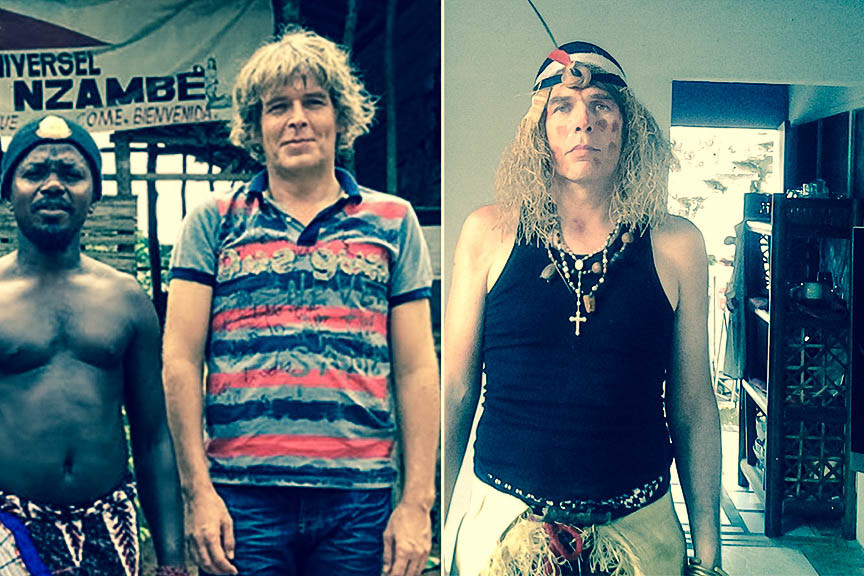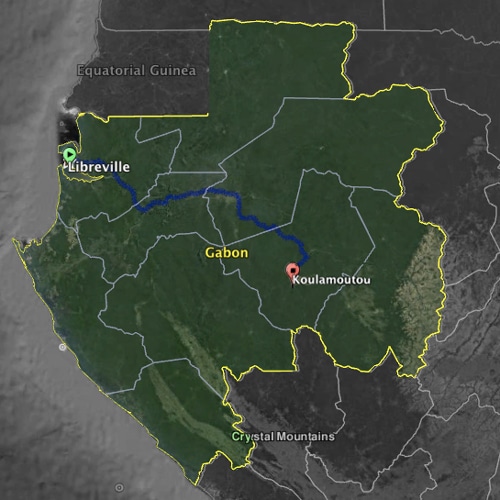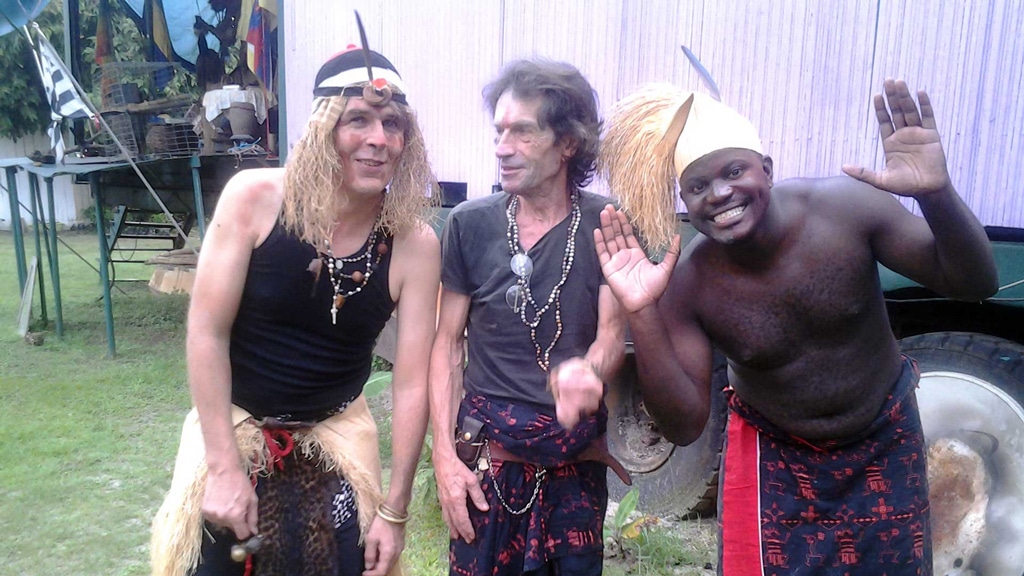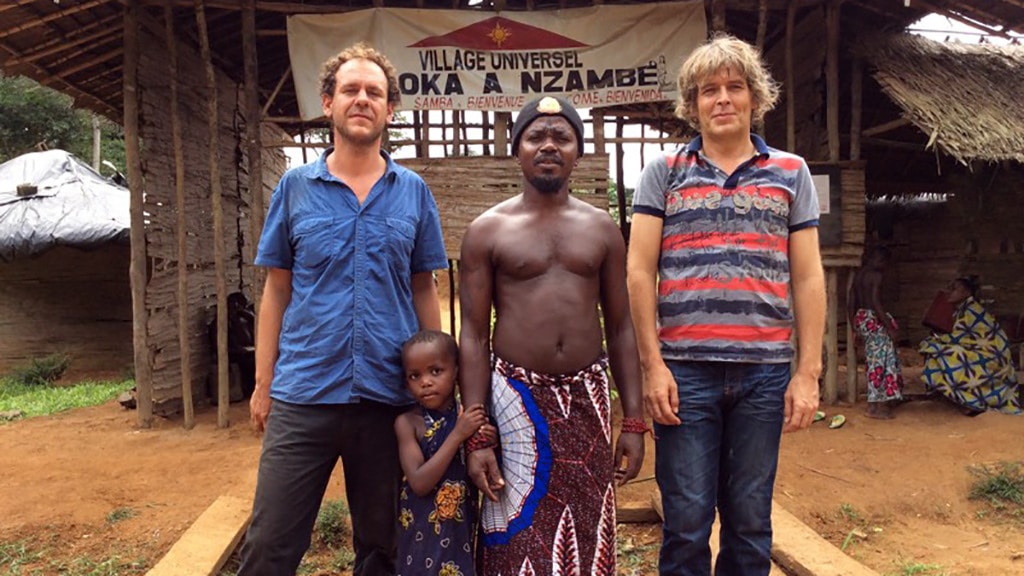How has Western influence changed the traditional use of iboga in Gabon? | Part 3
What is the authentic Bwiti tradition? The answer I got was that this idea of authenticity is an odd idea. It’s a very Western idea. Bwiti considers itself as a culture that’s changing. Read the full series.

Psymposia is a 501(c)(3) nonprofit research and media organization that offers critical perspectives on drugs, politics, and culture. We rely on contributions from our readers and listeners. Your support is vital to sustaining Psymposia.
Support Psymposia’s independent journalism on Patreon and help us drive the Mystery Machine! We’re a bunch of meddling kids who are unmasking the latest shenanigans on the psychedelics beat.
We wanted to understand Bwiti, the diverse Gabonese spiritual discipline that uses iboga. Unfortunately, we’re nowhere near Gabon and don’t speak French. Fortunately, we found a bridge between worlds who has been around it for over a decade.
Jean-Nicolas Dénarié arrived in Gabon from France in 2006 as a math teacher for an engineer training program. After his experience with iboga, he decided to stay. Between 2008 and 2009, he was initiated into three different Bwiti traditions. He has since participated in and supported different local projects including recently co-founding SOVATER, a Gabonese company that promotes sustainable use of Gabonese resources and culture.
What’s your story? How did you end up in Gabon, and when did your relationship with iboga begin?
Jean-Nicolas: I arrived in Gabon by chance for work 11 years ago. The first year I was here I never went to a temple. I was just living in the city and didn’t know much about tradition here. I went to Tatayo’s place for the first time. [Tatayo conducts ceremonies with iboga.] The ceremony was starting when I arrived, and I ate one spoon of iboga.
It had a rather impressive effect on me. I was initiated 6 months later, in February of 2008. It was so surprising to me that I needed to understand more. I wanted to go to a ceremony that would be closer to the forest because during my first experience I felt that iboga has something to do with the forest.
So I spoke with people around here, and they explained to me that Tatayo’s Bwiti [practice] is a mix of Fang Bwiti and of Missoko Bwiti. Fang Bwiti is supposed to be last in the chronological order, except now I think the last Bwiti is the Bwiti of white people. But in Gabonese Bwiti, the Fang is the last. I learned that in the Missoko Bwiti there are two major trends. The Ngonde trend and the Mioba trend. The Mioba trend is closer to the forest and to curing, while the Ngonde trend is closer to prophecy, vision, so it speaks more to the village because it’s in the village that you try to build the future.
I was more interested in the Mioba style, but it’s not well-represented in Libreville [the capital of Gabon], so I had to go to Koulamoutou, which is 500 km east from here. I was initiated there after 6 months, in 2009. It was a very nice ceremony that lasted 3 days and 3 nights.
Each ceremony you go to, you eat a bit of iboga, so I can say that I regularly ate iboga at this time. I still go to ceremonies when I find time.

Could you give a bit of background about the use of iboga in Gabon?
I think Bwiti is all around Gabon, in every village. If you go on the roads and you look into the villages, you keep on seeing temples. The impression it gives me is that there are Bwiti temples all around. At the same time, when you speak with people in the streets of Libreville, they will never tell you that they do Bwiti.
Here in the city, particularly, what dominates in terms of religion is the evangelist tradition. It’s more of a Protestant trend. Here in Gabon there are a lot of Catholic churches, but most Christians here are evangelists.
So when you speak with people, they won’t be the first to talk about Bwiti – but if you start talking to them about it, they’ll know someone or have somebody in their family who practices.
So iboga and Bwiti are both pretty common even though people may not initially bring it up, but if you dig deeper it’s clear that everybody knows someone who practices Bwiti?
Exactly.
In Libreville, I think at least half of the population is not Gabonese. Everything here is more expensive, so many African people from outside of Gabon come because they can make much more money than any other city around. Many strangers are attracted, and Islam has developed a lot since the 70’s, so now it’s changing. When you speak with strangers in the streets, they won’t know anything about iboga.
You started to touch on this, but could you expand some more about the effect that French colonization and Christianity had on Gabon, specifically on Bwiti?
Part of my question, when I wanted to get initiated in a more authentic way, was to ask if this tradition is authentic. The authentic Bwiti tradition, what is it? I tried long ago to answer this question and the answer I got, I could say from Bwiti, was that this idea of authenticity is an odd idea. It’s a very Western idea.
For example, when a guy does a ceremony in Koulamoutou he does it because he learned it beside his Father [of initiation], his father in Bwiti. And with his Father, he did many ceremonies and learned how to do it. Of course after, he does it in the same way, but there’s not this obsession with keeping it exactly the same. They have a very precise way of how it should be done, but it’s not because it has to be done exactly the same way. It’s more because in Bwiti we always say, “Bwiti is first yourself.”
I have something to say about the interview actually, if you don’t mind. All that I say is just a point of view from a Western guy that’s spent 10 years here, but not studying Bwiti. I wouldn’t say I study in Bwiti, because to study Bwiti is to be in the temple every day. I’m working, so it’s not possible to do that for me. I’m not a healer. I’m just a Western guy that is trying to understand what this is. I’m just interested in the subject.

Thank you for bringing that up. That’s something we actually wanted to mention very explicitly, that you’re a French guy living in Gabon, and we’re obviously missing something by not being on the ground in Gabon to speak with Gabonese people.
So when you do the Bwiti, there’s a rather important prayer during the ceremony and it’s performed when your concentration is at its most. The prayer is called the Mwaru. To be initiated, the initiate has to know the Mwaru. They all have their own Mwaru. In this prayer, you tell the story of how you became yourself. And telling this story, you tell the story of the ancestors, and at the same time you tell the story of how Bwiti changed.
What’s interesting is that Bwiti considers itself as a culture that’s changing. I saw this as different from our traditions. So when you ask the question, “how has Bwiti changed, have Western people changed Bwiti?” I think Bwiti is always changing. Of course, as the people that were doing Bwiti came in contact with Western people, it changed the way they do it.
I observed that they use objects they like. For example, as soon as money arrived in Gabon, I’m quite sure that it arrived in Bwiti temples because it was something that was seen as valuable. When you do a ceremony, you bring everything that is valuable that you can find. You take the best plant from the forest. You get the best palm wine. You get everything that you can find. So if money was considered valuable, then money would go in the temple. And it’s not changing Bwiti, that money arriving in the temple. It’s just Bwiti expressing itself through this new way.
Now you have many Christian crosses, particularly in the Fang tradition. Christian crosses entered into the temple, and even saints. They sing many songs for God. “God brings us many benedictions,” and “We thank God for benedictions,” and things like that. Any sacred representation can enter into the Bwiti temple.
So by its nature, Bwiti is a tradition that’s very fluid, open, and changing versus strictly adhering to specific customs?
There’s not two temples that will do exactly the same Bwiti. You can’t have that. It’s not possible. It’s like a kaleidoscope.
What Bwitists would say is that Bwiti speaks every language.

What’s the Gabonese impression of the use of ibogaine in the West?
They are not aware of it.
There’s no awareness in Gabon of ibogaine being used to treat addiction in Western countries?
No. I mean, if you ask somebody in the streets, they wouldn’t know.
Wow, okay. Do you forsee the growing interest in ibogaine having an impact on Gabon in the future?
Of course there’s the subject of the impact on iboga supply in Gabon. If the use of ibogaine implies that iboga has to be collected in Gabon, and is collected in a way that exceeds actual supply, stock could disappear.
I participate in a project called SOVATER, and it’s a project that wants to bring the benefits of the forest to the countryside through different forest plants.
We’re writing a paper to present the project. Gabon signed the Nagoya Protocol, which is an international protocol that explains how genetic and cultural resources of a country should be distributed and things around that. We’re in touch with the Ministry of Wood and Forest in Gabon, and we’re speaking with them to set up sustainable and fair trade for these kinds of products, which include iboga.
There’s not just iboga. When you’re in a Bwiti temple, they don’t only use iboga. You have to spend many years learning about plants from the forest to do the job properly. That’s why I think there’s a big difference between what happens in the West and what happens here with iboga. Iboga in itself is an excellent product. Instead of wasting iboga producing big amounts of ibogaine, maybe we should try to start learning how to use iboga itself.
We have to do research to show there are ways to heal with iboga, but actually we heal with iboga here in Gabon every day.
Read Part 4: We are Bwitists and healers in Gabon. Here’s what we think of the global interest in iboga
Hey! Before you go… Psymposia is a 501(c)(3) non-profit media organization that offers critical perspectives on drugs, politics, and culture. We strive to ask challenging questions, and we’re committed to independent reporting, critical analysis, and holding those who wield power accountable.
Our perspectives are informed by critical analysis of the systemic crises of capitalism that have directly contributed to the unmitigated growth of addiction, depression, suicide, and the unraveling of our social relations. The same economic elite and powerful corporate interests who have profited from causing these problems are now proposing “solutions”—solutions which both line their pockets and mask the necessity of structural change.
In order for us to keep unpacking these issues and informing our audience, we need your continuing support. You can sustain Psymposia by becoming a supporter for as little as $2 a month.





